|
|
Reviewed by Glenn Erickson
Really good movies about children are rare at any time. The best-remembered picture from the 1960s is probably Robert Mulligan's sober To Kill a Mockingbird. But this unassuming comedy from 1964, about contemporary young teens in New York City, is at least as perceptive. Balanced between slapstick comedy and keen insights into the world of youth, George Roy Hill's The World of Henry Orient is now considered one of the best movies of its year.
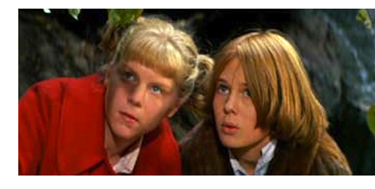
Remember director Terry Zwigoff's Ghost World? Look on the wall of Thora Birch's bedroom, and you'll see a poster for this wonderful 1964 comedy-drama that dares to take 13 and 14 year-old girls seriously. It's also one of the first American movies to depict the effects of divorce and broken homes on families and children, in a credible context.
The comic story is merely a framework for us to meet some delightful characters. New York pre-teens Val Boyd (Tippy Walker) and Gil Gilbert (Merrie Spaeth) become fast friends, even though Gil comes from a modest family of divorce, and Val is the daughter of wealthy absentee parents. For fun, the girls stalk and hassle their favorite celebrity, mediocre concert pianist Henry Orient (Peter Sellers). He's convinced that they are some kind of plot to entrap him in his adulterous relationship with the nervous young Stella Dunnworthy (Paula Prentiss). When Val's selfish, vain mother, Isabel (Angela Lansbury) tries to break up the pair, more trouble ensues.
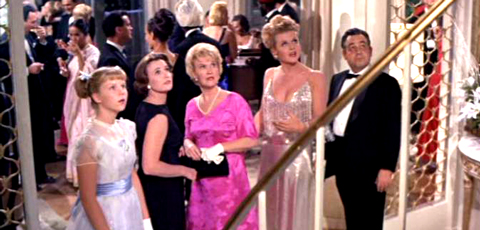
A good script, a creative director and a perfect cast come together in a story that centers on the emotional life of adolescents. Movies of 1964 hadn't yet closed the gap between The Parent Trap giggles and Juvenile Delinquent movies, and were still reeling from the misanthropy of The Bad Seed. Nora Johnson's perceptive script accurately pegs the post-Barbie, pre-boyfriend teenage years, when reality is just catching up with lives still engaged in play-fantasy. This is a subject that few movies peg correctly. Heavenly Creatures is a pathological look at two girls that don't outgrow this stage. Ghost World relates to The World of Henry Orient as almost an epitaph for American childhood, the sheltered world of children that no longer exists. Val and Gil roam the streets of New York unsupervised while stalking their favorite celebrity and pulling pranks on confused adults. They wander at will in relative safety; in today's world their parents would be inviting charges of child endangerment.
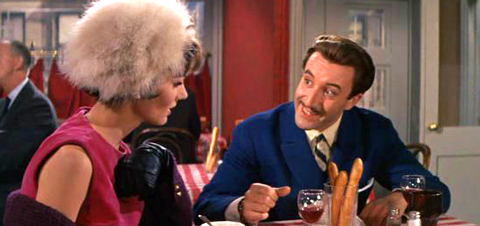
The commercial hook for the film is Peter Sellers' sharply crafted comedy turn. The vain concert pianist Henry Orient sports a fake Italian accent. His two youngest fans repeatedly scuttle his adulterous amorous schemes, to lure Stella back to his bed. Sellers works extremely well with Paula Prentiss, who gives her skittish character everything she's got. Prentiss isn't the bright and snappy female of her MGM Jim Hutton vehicles, but instead plays her 'wacky' character almost straight. In the picture's broadest gag, her attempt to rendezvous with Orient is foiled by twenty NYPD cops that think that she's Jayne Mansfield, and that they're rescuing her from a kidnapping. Her only reaction is an incoherent, 'Ffmahh!' as she falls forward out of frame. One imagines what would happen if all Ms. Prentiss' talents had been given free rein. 1
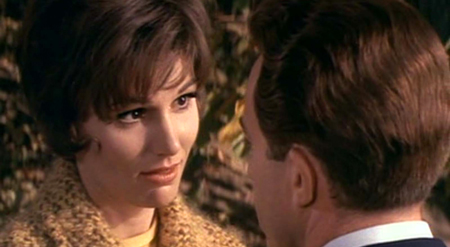
Sellers' faux-European lothario is no stretch, but he's got the part down cold. At this stage in his career he was on the threshold of a stardom that ruled out films that didn't revolve exclusively around him; perhaps he just recognized a perfect part when he saw one. The only dated cinematic devices in the picture are the too-emphatic speed-ups and musical outbursts used to underline Orient's panic, when he thinks some irate husband is going to catch up with him. The show also has a highly amusing concert scene, with the conductor not disguising his loathing for the no-talent Orient. A later performance is so bad that the stage door crowd heckles Orient as if he were a condemned criminal. 2
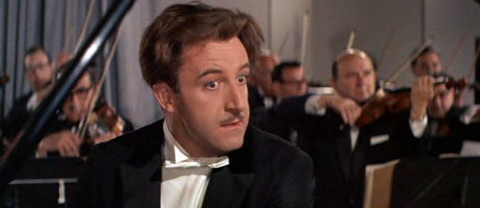
The World of Henry Orient won director George Roy Hill a lot of attention for his creative visuals, with special notice given to his direction of the two girls frolicking on the city streets. Owing something to Jean Vigo's Zero for Conduct and perhaps Truffaut's The 400 Blows, there's a sequence of maybe twenty shots that uses tilted cameras and slow & fast motion, to express the exhilaration and energy of being 13 and able to run for blocks while vaulting fireplugs and shouting out loud. Many an essay on editing directs film students to study the sequence where the leaping girls rise slowly in the frame, and across a careful series of cuts continue forever upward, seemingly defying gravity. Elsewhere, Hill's blocking of scenes is masterful -- in one parental dialogue exchange, the girls can be seen sneaking downstairs in a mirror placed in the background of the shot. It doesn't seem at all forced or indulgent. George Roy Hill's 'liberated camera' approach to some degree reflected the casual, carefree style of the French New Wave. Unlike most American movies of the time, we don't feel the presence of a big crew arranging action around a heavy, mostly immobile camera.
The carefully written intimate dialogue scenes are where Hill's direction and the Johnsons' script really come together. The girls' unforced acting can't have been easy to master, but the spirit is all there, in unbroken master shots devoid of lazy coverage angles. Merrie Spaeth had practically no career beyond this show, and Tippy Walker only a few more credits, but here they are spot-on perfect, from the way they relate by mutual hatred of their teachers, to the credible way they dress at slightly different developmental ages. Val wears a ragged but still impressive full mink coat, a telltale clue toward her wealthy background. 3
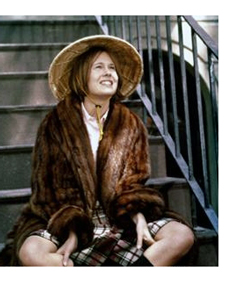
The rest of the cast forms a smartly judged ensemble. As Val's spoiled and selfish mother, Angela Lansbury solidifies her villainess persona. She's treated rather fairly by a script that sees her as a victim of her own weaknesses and prejudices. At least she's given more human qualities than the harpy-wife she plays in the same year's Dear Heart -- when Henry Orient turns on the charm, Lansbury's society wife melts with appreciation. Tom Bosley uses his comforting voice to good effect as the father who realizes his girl still needs him.
After so many movies where the 'cure' for divorce is for couples to reunite, The World of Henry Orient shows one set of parents breaking up while the other separated long ago. Gil's mother is played with sweet affection by Phyllis Thaxter, a favorite who started in the MGM factory. Her top emotional picture is Thirty Seconds Over Tokyo, and her stab at leading lady stardom was Arch Oboler's uneven Bewitched (1945). Twenty years later, Ms. Thaxter's eyes still crinkle the same cute way. Good work is offered by Bibi Osterwald as Thaxter's older, divorced friend Boothy, who gets some of the best lines, calling Gil's school a 'snob factory,' etc. Famous pianist Peter Duchin also has a small role; he's the actual Duchin depicted as a child in The Eddy Duchin Story. Interestingly, both it and this picture are great movies for admiring New York City in various seasons. Musically, Elmer Bernstein's score captures the adolescent spirit perfectly. He finds several pleasing moods, even if one of them is rather reminiscent of his Western scores.
The biggest miracle is the vivid representation of the girls' secret world of make-believe, put-ons, sub-teen gaucheries ("You shaved your legs!") and troubled emotions. The girls work up a maudlin fantasy daydream about Gil's long-departed father returning, as if in a cheap novel. The pain and longing are in Gil's face as she imagines daddy coming home, but there's also a resigned look that tells us she's beyond getting too worked up over such thoughts. We can almost see Gil growing up on-screen. The World of Henry Orient has scenes about what it means to be a kid, that encompass what it takes entire books -- Huckleberry Finn, Dandelion Wine -- to communicate.

The Twilight Time Blu-ray of The World of Henry Orient is yet another vastly improved scan of a film favorite. The company carefully picks its titles to favor new or improved transfers, and now can be counted on for quality in all instances. This may mean that some favorites are slow in arriving, but waiting for them is better than seeing a sub-standard transfer. That happened with the DVD of Henry Orient from back in 2002 -- it had pale color and distorted audio, that hasn't been improved on disc until now.
Boris Kaufman and Arthur J. Ornitz' camerawork finally looks as bright and colorful as it should; transfer technology has improved to the point that great color can be pulled from slightly faded elements, with better results than can be obtained in a photochemical release print. We are now aware of specific times of day as Val and Gil race across town and rush through Central Park. The Sellers / Prentiss scenes look as glamorous as something from The Pink Panther, providing a good contrast for their knockabout comedy. The special Paula Prentiss is very attractively filmed, which wasn't always the case in her MGM films.
The biggest improvement is in the audio, which has now recovered its balance between Gil and Val's chattering voices and Elmer Bernstein's gentle, sweet soundtrack music. It's auditable on TT's Isolated Score Track. The original trailer sells the comedy well enough. The movie certainly made George Roy Hill's reputation in the industry; he went direct to Walter Mirisch's production of Hawaii.
Music expert Jeff Bond joins TT's Nick and Nora Julie for an informative, relaxed commentary that sounds as if it's being conducted over cocktails. It's a good approach. Julie Kirgo's liner notes abound with facts about the film's authors, the father-daughter team of Nora and Nunnally Johnson. Nora patterned the Orient character on her own childhood crush for Oscar Levant, who hopefully practiced his piano playing better than Henry.

On a scale of Excellent, Good, Fair, and Poor,
The World of Henry Orient Blu-ray rates:
Movie: Excellent
Video: Excellent
Sound: Excellent
Supplements: Isolated Score Track, Trailer, Commentary with Nick Redman, Julie Kirgo and Jeff Bond, Julie Kirgo liner notes
Deaf and Hearing Impaired Friendly?
YES; Subtitles: English
Packaging: Keep case
Reviewed: July 18, 2015
Footnotes:
1. Ms. Paula Prentiss, a teenage heartthrob for Savant, came to the 2014 TCM Film Festival in Hollywood, and was interviewed with Merrie Spaeth before a noon screening of The World of Henry Orient. Prentiss confirmed the story that the married George Roy Hill and the under-aged Tippy Walker had some kind of relationship during the film shoot. Times have changed, or have they? (For that matter, Sellers' Henry makes a comment about drugging Prentiss' Stella with Miltowns, so he can seduce her. It's still funny, Cosby or no Cosby.) She's very proud of the picture, even though it's yet another 'goofy' comedy role. I always thought Ms. Prentiss had the looks of a European sex goddess -- Capucine, etc. -- but with a plain spoken American grace. She really seems like someone easy to talk to. I had to leave the screening early and made a note of exiting up the aisle near her seat -- where she was watching the film with complete attention, looking just like a bright college girl. The best to her.
Return
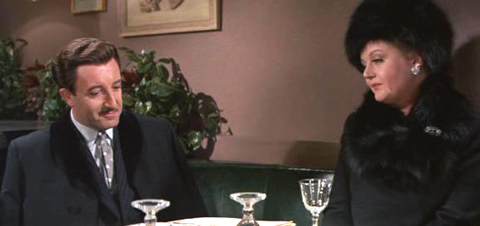
2. Peter Sellers wrecked his career altering scripts and making absurd demands, while playing ever more fussy ethnic types. Against his usual M.O., in Henry Orient the neurotic actor sublimates himself beautifully into what is really a glorified supporting role. I've finally figured out why he was so cooperative in this instance: the movie offers him the opportunity to play a glamorous ladies' man. Henry Orient may be a heel and a charlatan, but visually he's a smooth charmer, especially in the impressive scene he shares with Angela Lansbury. Sellers seems to have wished that he could play romantic leads.
Return
3. Jim Long wrote a welcome note to tell Savant of Spaeth and Walker's careers as adults. Their separate entries in the IMDB (Merrie Spaeth and Tippy Walker) include interesting biographical details.
Return

Text © Copyright 2015 Glenn Erickson
See more exclusive reviews on the Savant Main Page.
Reviews on the Savant main site have additional credits information and are often updated and annotated with reader input and graphics.
T'was Ever Thus.
Return to Top of Page
|


